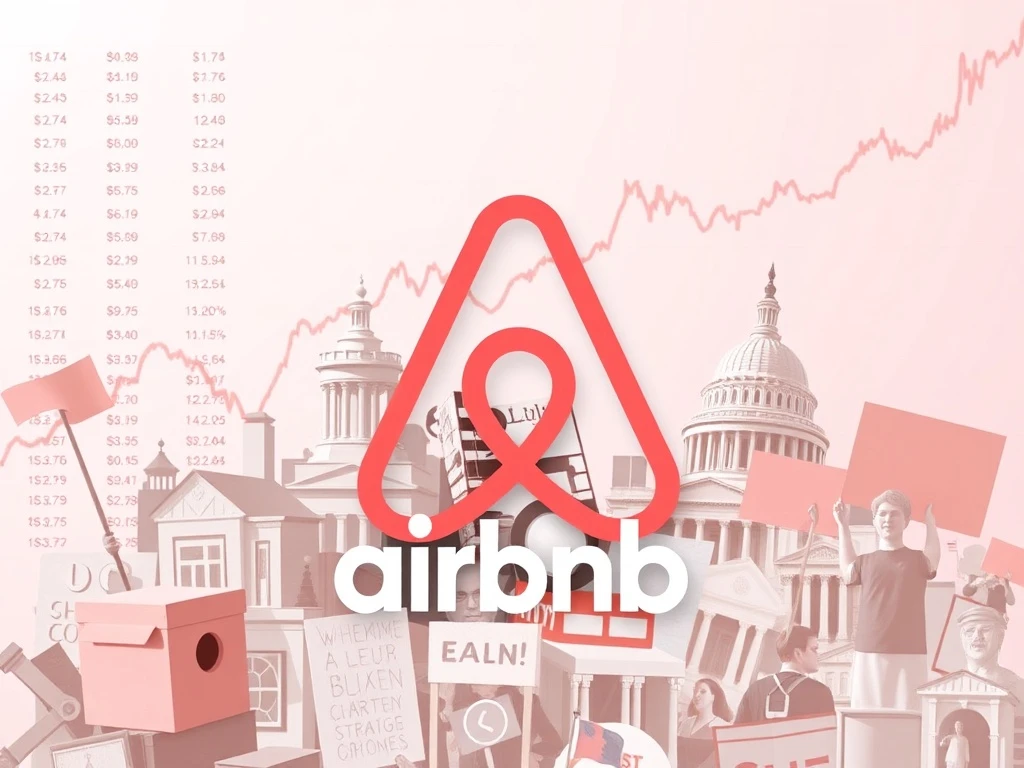For entrepreneurs and business leaders, understanding the intersection of corporate strategy and public policy is crucial. Airbnb, a global hospitality leader, increasingly finds itself at this intersection. Its deepening **Airbnb political involvement** could significantly reshape its operational landscape and financial trajectory. This article explores how Airbnb’s proactive engagement in policy debates might impact its profitability and long-term sustainability.
Understanding Airbnb’s Political Involvement
Airbnb’s journey into the political arena began out of necessity. Initially, it faced a fragmented and often hostile regulatory environment. Many cities worldwide introduced strict rules on short-term rentals. These regulations directly challenged Airbnb’s core business model. Consequently, the company started advocating for more favorable policies. This reactive stance has evolved into a more proactive approach. Airbnb now actively lobbies governments and supports political campaigns. This strategic shift aims to shape the regulatory future of the sharing economy. It ensures the company’s continued growth and market access. Moreover, it protects its substantial investments in local economies.
For instance, Airbnb has engaged in numerous local battles. They often involve city councils and housing authorities. These engagements aim to prevent outright bans or overly restrictive regulations. In some cases, Airbnb has partnered with local hosts. They form advocacy groups to push for fair and sensible short-term rental laws. This **Airbnb political involvement** is not merely defensive. It is a calculated move to secure its operational freedom. It also expands its market reach globally. The company understands that its success hinges on navigating complex legal frameworks. Therefore, political engagement becomes a core business function.
The Double-Edged Sword of Political Advocacy
Political advocacy offers significant advantages for companies like Airbnb. Favorable regulations can unlock new markets. They can also streamline operations. For example, a city adopting clear, permissive short-term rental rules benefits Airbnb directly. This reduces legal uncertainties for hosts. It also encourages more listings. Consequently, it boosts revenue. Furthermore, successful lobbying can create a level playing field. It can prevent competitors from gaining unfair advantages. This strategic **Airbnb political involvement** helps solidify its market position. It allows the company to grow without constant legal challenges.
However, this path carries substantial risks. Taking strong political stances can alienate customer segments. It can also trigger public backlash. For instance, if Airbnb supports policies unpopular with local residents, it might face boycotts. Such actions can damage its brand reputation. Moreover, political battles are costly. They involve significant spending on lobbying, legal fees, and public relations campaigns. These expenses can weigh on profits. Unsuccessful campaigns waste resources. They can also lead to more restrictive environments. This means that while **Airbnb political involvement** can yield rewards, it also presents considerable financial and reputational hazards. Companies must carefully weigh these potential downsides.
Consider the varying public opinions on short-term rentals. Some view them as vital for tourism and local economies. Others blame them for housing shortages and rising rents. Airbnb’s political actions must navigate these conflicting views. A misstep can have widespread negative consequences. Therefore, strategic communication is paramount. The company needs to articulate its value proposition clearly. It must also address community concerns. Balancing these elements is a continuous challenge.
Analyzing Financial Impact and Profitability
Direct costs associated with **Airbnb political involvement** are significant. Lobbying efforts require substantial financial investment. This includes retaining lobbyists, funding political action committees (PACs), and contributing to campaigns. These expenditures can run into millions of dollars annually. For example, a major legislative battle in a key market might necessitate extensive legal and PR resources. These costs directly reduce a company’s net income. They represent a tangible drain on profitability. Investors closely watch these figures. They assess how political spending impacts the bottom line.
Indirect costs also impact profitability. Negative public perception can lead to reduced bookings. It can also deter new hosts. A decline in user base directly affects revenue. Boycotts, though often short-lived, can create significant dips in demand. Furthermore, prolonged legal battles can divert management attention. This distracts from core business operations. It can hinder innovation and expansion. Therefore, the financial implications of **Airbnb political involvement** extend beyond simple cash outlays. They encompass potential revenue loss and operational inefficiencies. Companies must meticulously track these impacts.
Here are some ways political involvement can affect profits:
- **Direct Spending:** Lobbying fees, campaign contributions, legal expenses.
- **Reputational Damage:** Reduced customer trust, boycotts, negative media coverage.
- **Regulatory Hurdles:** Fines for non-compliance, increased operational costs due to new rules.
- **Market Access:** Gaining or losing access to key markets based on regulatory outcomes.
Investors pay close attention to how these factors influence a company’s financial health. They look for stability and predictable growth. High levels of political risk can make a stock less attractive. This affects its valuation and investor confidence. Consequently, managing **Airbnb political involvement** becomes critical for shareholder value.
Navigating Complex Regulatory Landscapes
The regulatory environment for short-term rentals is incredibly diverse. It varies significantly from one city to another. What is permissible in one jurisdiction may be illegal in another. This fragmented landscape complicates Airbnb’s operations. The company must develop tailored strategies for each market. This requires deep local knowledge and strong relationships. For instance, regulations in New York City differ vastly from those in Paris or Tokyo. Each requires a unique approach to **Airbnb political involvement**.
Airbnb’s strategy often involves a multi-pronged approach. This includes:
- **Direct Lobbying:** Engaging with lawmakers at local, state, and national levels.
- **Public Campaigns:** Running advertisements and grassroots initiatives to sway public opinion.
- **Legal Challenges:** Contesting unfavorable laws in court.
- **Partnerships:** Collaborating with tourism boards, small businesses, and host communities.
This comprehensive strategy aims to create a more predictable operating environment. It seeks to ensure the long-term viability of its business model. However, the sheer scale of this effort is immense. It demands significant resources and continuous adaptation. Successful navigation of these landscapes is key to future growth. It also helps mitigate potential profit drains. Therefore, the complexity of **Airbnb political involvement** is a constant challenge for its leadership.
Future Outlook for Airbnb’s Political Involvement
The future of **Airbnb political involvement** will likely involve continued engagement. The sharing economy is still evolving. New regulations will emerge. Airbnb must remain agile and responsive. Its ability to adapt to changing political climates will be crucial. This includes anticipating future legislative trends. It also means engaging proactively with policymakers. The company’s long-term success depends on its capacity to shape its regulatory environment. It cannot simply react to external pressures.
Furthermore, corporate social responsibility (CSR) plays an increasing role. Companies are expected to contribute positively to society. They must address concerns about housing affordability and community impact. Airbnb’s political strategies must align with broader societal goals. This can enhance its public image. It can also foster goodwill among regulators and consumers. Balancing profit motives with social responsibility is a delicate act. However, it is essential for sustainable growth. Companies that ignore this balance risk alienating stakeholders. This can ultimately harm their financial performance. Therefore, a thoughtful approach to **Airbnb political involvement** is vital.
The company will also need to monitor global trends. These include increased scrutiny of tech giants. They also involve concerns about market power. Governments are becoming more assertive in regulating digital platforms. Airbnb must be prepared for this heightened oversight. Its political strategy will need to evolve constantly. This ensures it remains effective in a dynamic global landscape. Ultimately, successful **Airbnb political involvement** will be a cornerstone of its continued profitability and expansion.
In conclusion, Airbnb’s increasing political engagement is a critical aspect of its business strategy. While it offers opportunities for market expansion and regulatory clarity, it also carries substantial risks. These risks include significant financial costs, potential brand damage, and complex legal battles. Navigating this intricate landscape effectively will determine Airbnb’s long-term profitability and its standing as a global leader in the hospitality sector. The balance between proactive advocacy and careful risk management remains paramount for the company’s future success.
Frequently Asked Questions (FAQs)
Q1: Why is Airbnb getting more involved in politics?
Airbnb’s increased political involvement stems from the need to shape favorable regulations for its short-term rental business model. Many cities initially imposed strict rules or outright bans, prompting Airbnb to proactively engage with policymakers to protect its operations and facilitate growth.
Q2: How does Airbnb’s political involvement affect its profits?
Political involvement can affect profits in several ways. It incurs direct costs like lobbying fees and legal expenses. Indirectly, it can lead to reputational damage, customer boycotts, or market access restrictions if policies are unfavorable. However, successful advocacy can open new markets and streamline operations, boosting revenue.
Q3: What types of political activities does Airbnb engage in?
Airbnb engages in various political activities, including direct lobbying of government officials, funding political action committees (PACs), contributing to political campaigns, running public awareness campaigns, and initiating legal challenges against unfavorable regulations. They also partner with local host communities for grassroots advocacy.
Q4: What are the main risks of Airbnb’s political strategy?
The main risks include significant financial expenditure on lobbying and legal battles, potential public backlash or boycotts if their political stances are unpopular, and the risk of alienating certain customer segments. Unsuccessful campaigns can also lead to more restrictive operating environments.
Q5: How does Airbnb manage the diverse regulatory landscape globally?
Airbnb manages the diverse regulatory landscape by developing tailored strategies for each market. This involves extensive local knowledge, direct engagement with local lawmakers, public campaigns, and forming partnerships with local stakeholders. They adapt their approach based on the specific legal and political environment of each region.






















